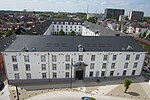Galapagos NV
1999 establishments in BelgiumAC using state parameter: expandedBelgian brandsCompanies based in Antwerp ProvinceCompanies in the BEL 20 ... and 3 more
Companies listed on Euronext BrusselsPharmaceutical companies established in 1999Pharmaceutical companies of Belgium
Galapagos NV (formerly known as Galapagos Genomics) is a Belgian pharmaceutical research company which was founded in 1999. Its headquarters are located in Mechelen and has additional locations in Leiden, Romainville, Basel, Milan, Madrid, Boston and Zagreb. The outgoing CEO is the Dutchman Onno van de Stolpe and his replacement is Paul Stoffels, effective April 1, 2022. The company develops drugs against rheumatoid arthritis, Crohn's disease, ulcerative colitis, psoriasis, systemic lupus erythematosus and cystic fibrosis.
Excerpt from the Wikipedia article Galapagos NV (License: CC BY-SA 3.0, Authors).Galapagos NV
Generaal De Wittelaan, Mechelen
Geographical coordinates (GPS) Address Nearby Places Show on map
Geographical coordinates (GPS)
| Latitude | Longitude |
|---|---|
| N 51.055277777778 ° | E 4.4522222222222 ° |
Address
Generaal De Wittelaan 9
2800 Mechelen (Mechelen)
Antwerp, Belgium
Open on Google Maps







